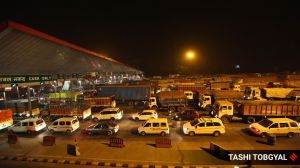No turning back on the turning away
The death of ten Pakistanis in a firefight with alleged Al Qaeda fighters in the tribal areas indicates the dangers that lie ahead for Pakis...

The death of ten Pakistanis in a firefight with alleged Al Qaeda fighters in the tribal areas indicates the dangers that lie ahead for Pakistan in the war against terrorism. It is further evidence that there is no turning back from General Pervez Musharraf8217;s decision to join the international coalition against terrorism. Even if Pakistan wanted to nuance its position on the issue, making distinctions between terrorists targeting the United States and terrorists opposed to Pakistan, neither its international friends nor the terrorists will allow such distinctions. Pakistan must now bravely complete its U-turn and end its reputation as a militant-infested nation. Or it can allow the ideology of militancy take over the state, pushing it on collision course with the rest of the world.
General Musharraf8217;s January 12 address to the nation officially marked the end of the Mosque-Military alliance forged by Pakistan8217;s previous military ruler, General Ziaul Haq. The tactical deployment of Islamic militancy was discovered by the Pakistani state when it was confronted by Bengali nationalism in the erstwhile East Pakistan. Instead of granting democratic rights to the Bengalis or negotiating with their leaders, Pakistan8217;s then military leaders helped organise volunteer militias named Al-Badr and Al-Shams with the help of religious political parties. The militias fought alongside the Pakistani forces during the Bangladesh war of 1971 that Pakistanis would rather forget. After the fall of Dhaka, these volunteers were deserted by the Pakistani state. This time, the Islamic militants are unwilling to be ditched as a result of shifts in Pakistan8217;s policies.
In his January speech, General Musharraf argued that he was already working on restraining religious extremism and gave a chronological listing of his government8217;s efforts in this respect. New restraints on the use of mosques for political purposes and a new 8216;madrassah strategy8217; was also announced and is now slowly being implemented. But the timing of his crackdown is clearly linked to external factors. Pakistan8217;s well-wishers at home and abroad have called for the regulation of mosques and madrassahs and for the banning of 8216;8216;extremist8217;8217; groups, for many years. General Musharraf took no decisive steps in that direction until the September 11 attacks on the US and the massing of Indian troops on the Pakistan border.
It appears to be a pattern with General Musharraf that his definitive actions are often reactive. His decision to take over the reins of power was a reaction to Nawaz Sharif8217;s action to remove him from the office of chief of Army Staff. Withdrawal of support from the Taliban resulted from US demands in the aftermath of the September 11 attacks. Now, action against militant groups is a response to demands by the international community. Even if General Musharraf8217;s heart is in the right place on issues that matter to the world and Pakistanis, his hesitation to act without pressure creates doubts about the credibility of his actions.
Soon after Musharraf8217;s January 12 speech, I had written, 8216;8216;The militant Islamists could try and undermine General Musharraf8217;s new initiatives by launching terrorist attacks inside the country, as well as in Jammu and Kashmir or India8217;8217;. Several such attacks have since taken place. But the Musharraf regime8217;s ability to disarm the Islamic militias has been severely handicapped by its inability to seek the cooperation of legitimate Islamic, or for that matter even secular, political groups. It has managed to antagonise traditional religious political parties without disarming Islamic militias. Instead of making the war against terrorism a battle for Pakistan8217;s survival, Musharraf has inadvertently allowed it to be cast as America8217;s war being fought with Pakistan8217;s help.
Pakistan8217;s Islamists have never been able to do well in electoral politics. Their strength in recent years was the direct result of covert state patronage and the decision by successive rulers to assign them a role in their regional strategy. An uninterrupted political process would have allowed extremes to be subsumed and marginalised.
|
The military regime hasn8217;t sought the cooperation of legitimate Islamic groups in disarming militias. Instead, it has antagonised traditional religious parties and allowed the war against terrorism to be cast as a US war being fought with Pakistan8217;s help |
Over the last several decades, Pakistan has fallen victim to the cult of the Islamic warrior, instead of glorifying the Muslim scholar or intellectual. There is little effort, for example, to highlight the position of Razi, the philosopher, while the nation is in thrall to Ghauri and Abdali, the conquerors. A serious effort at re-orienting the nation8217;s priorities would have to address this anomaly in an age where knowledge is power. But to do so seriously, Musharraf8212;the general8212;may also have to step down from his own pedestal of a military commander. And that is something Pakistan8217;s military leaders have always been reluctant to do.
Pakistan has degenerated into semi-anarchy in pursuit of strategic objectives of dubious value. But the restoration of the writ of state will need rehabilitation of all institutions of state. The moves to disarm all privates militias needs to be extended to ethnic as well as Islamic militant groups. If General Musharraf wants his moves to be seen in the context of revitalising the Pakistani state, he must allow a review of the military8217;s worldview that led to the strategic decisions he now claims he is reversing. If the militarist-militant alliance is to be broken, democracy and constitutional rule will have to be restored in Pakistan. Else, terrorists will continue to boldly challenge a state apparatus that lacks both legitimacy and broad public support.
Husain Haqqani is a Visiting Scholar at the Carnegie Endowment for International Peace in Washington. He served as adviser to prime ministers Nawaz Sharif and Benazir Bhutto and as Ambassador to Sri Lanka
- 01
- 02
- 03
- 04
- 05































